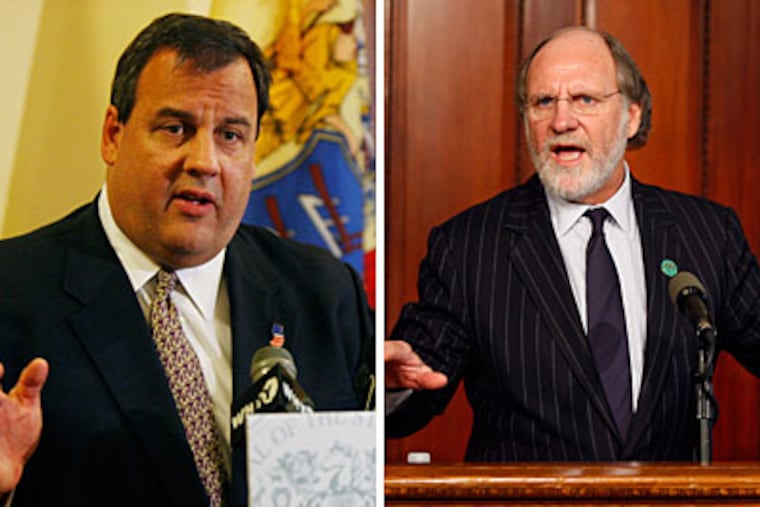Tall order for Santa: Better N.J. campaigns
Garden State politics is stuck on the naughty list.

By Ingrid W. Reed
Have you noticed that people express some of their deepest hopes to Santa Claus? They go well beyond requesting mere toys from jolly old St. Nick, voicing real yearnings for things that can't be bought - such as their two front teeth, for example, or, in Miracle on 34th Street, little Maggie's hope for a family house in the suburbs with a play set, or Mariah Carey's plaintively singing, "All I want for Christmas is - you." If you can't get what you long for any other way, maybe Santa can produce it.
So here is my policy wonk's request to Santa: Please bring us better campaigns in New Jersey. Since I realize that is a tall order even for Santa Claus, I am willing to amend it to wish for a watchdog group that will work to improve the state's campaigns.
New Jerseyans are still lamenting the latest campaign no one liked, the one for governor. And then there were the campaigns no one knew about, those in the 40 Assembly districts.
We spent much of the fall complaining about one of the most negative campaigns the state had endured. Polls showed that voters blamed both candidates equally. And we can speculate that the nature of the campaign had something to do with this year's lowest turnout ever recorded for a gubernatorial election, 46 percent.
Kathleen Hall Jamieson of the University of Pennsylvania has said that candidates do three things in campaigns. The first is to advocate for themselves - explaining why you should vote for them. The second is to attack the other candidates - explaining why you should not vote for their opponents. And the third is to underscore contrasts by comparing themselves with the other candidates.
Alas, this year, New Jersey voters mostly got attack ads perceived as disrespectful, nasty, and irrelevant. The candidates rarely spoke for themselves, relying instead on murky pictures, menacing anonymous voices, and creepy music. Plus, voters did not know what to believe about the attacks - whether they were accurate, partially true, or simply misleading.
But it doesn't have to be that way. The time to start improving the campaigns of 2011 and 2013 is right now (or at least right after the holidays). Obviously, the right to free speech means that candidates can say what they want. But that doesn't mean that voters can't get some help holding the candidates accountable for their campaigns.
Here are some of the things a civic group dedicated to improving campaigns could do:
Maintain a record of ads produced by the campaigns and categorize them according to whether they advocate for the candidate, attack opponents, or draw a contrast. A balance of the three is most useful to voters. (The Leadership New Jersey alumni group used such a strategy in 1997 to explore the issue of improving campaigns.)
Fact-check the ads. In the past, newspapers have performed such "ad watch" services. In the most recent presidential election, they were performed very effectively by university-based nonpartisan groups, using the Internet and other media.
Keep track of whether candidates speak directly to the voters. Did they say it themselves in their ads, or did they employ anonymous announcers, splashy headlines, and dramatic images?
An effective campaign watchdog would also make sure debates happen. The gubernatorial candidates this year did take part in three debates, but voters complained that they were not well publicized. And without public-financing rules that required the debates, they might not have happened at all.
Meanwhile, although the campaigns for governor were very visible, the contests for 80 seats in the Assembly, involving more than 160 candidates, appeared almost nonexistent.
The preliminary count of newspaper stories about Assembly races is disappointingly low. And without public-financing rules requiring Assembly candidates to debate, it appears that a total of about 10 debates took place in those races this year, few of which were televised. Voters ended up with little information about candidates for the Assembly, which initiates our state budget, among other important functions.
A watchdog group could encourage the Legislature to follow the state of Virginia's lead. There, candidates are required to provide information about themselves and their campaigns in addition to the mandated campaign-finance disclosures.
So, Santa, any watchdog group you bring would have lots to do. Could the town you're coming to be Trenton?